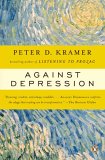Summary | Excerpt | Reviews | Beyond the Book | Readalikes | Genres & Themes | Author Bio

Critics' Opinion:
Readers' Opinion:
First Published:
May 2005, 368 pages
Paperback:
Jul 2006, 368 pages
 Book Reviewed by:
Book Reviewed by:
BookBrowse Review Team
Buy This Book
Many psychiatric practices have this quality as they mature.
Light depression
is depression in young adults; those patients were the ones ward
chiefs favored. Suicide is always a risk; we worry over it and guard
against it. Still, most patients in their twenties and early
thirties do well.
Often, a trigger for the acute episode is apparent, so there is
something
to discuss—the "precipitating event" and its relationship to
prior disappointments.
Psychotherapy plays a central role in treatment. The doctor
feels of use. But as the patient ages, bouts of depression recur
with
greater frequency. Later episodes can appear spontaneously,
without apparent
reason. They last longer, respond more poorly to any
intervention,
remit (when they do) more briefly. Certain functions may remain
continuously
impaired—concentration, confidence, the sense of self-worth.
Even with first episodes, there will be patients who respond
poorly
or incompletely. These hard-to-treat depressives linger in a
practice. I
will refer them for outside opinions. I will consider new and
experimental
interventions. Often, nothing works—or else, relapse follows
hard upon recovery. These patients struggle. I knew them when—or
just after, when life's promise was still evident.
For the psychiatrist, then, depression becomes an intimate. It
is poor
company. Depression destroys families. It ruins careers. It ages
patients
prematurely. It attacks their memories and their general health.
For us—
for me—the truth that depression is a disease is unqualified.
Depression
is debilitating, progressive and relentless in its downhill
course, as tough
and worthy an opponent as any a doctor might choose to combat.
In an important respect, my clinical practice stood at a
distance from
the testimony of the memoirs: I had never treated a seriously
afflicted
patient who, on recovery, said anything favorable about
depression.
Yes, in the grip of mood disorder, a patient may allude to a
sense of superiority.
The resilient are missing something; they do not get it. This
belief brings comfort in a time of suffering. But the
idealization rarely
outlasts the depression. When she feels better, the patient will
question
her own prior thought process. What was that about? She mistook
illness
for insight. She had been, quite literally, making a virtue of
necessity.
In retrospect, depression has no saving grace.
Outside the consulting room, the tendency to attach value to
depression
is common enough. Depression can appear to embody an aesthetic
or moral or even political stance. There is a left-wing
viewpoint, in
which depression represents moral distance from the culture,
asthenic
self-abnegation, minimalism in contrast to mercantilism. There
is a
right-wing perspective on depression as well—the notion that one
should "tough out" the suffering, without resort to "easy"
remedies like
psychotherapeutic support or medication. From either angle, left
or
right, there is virtue in experiencing illness rather than
seeking prompt
and thorough treatment. At least, it seemed to me that I heard,
in passing,
claims of these sorts, claims that would sound peculiar in
relation
to any other disease.
They outraged me. I discovered in myself a protectiveness toward
the
depressed, a wish for clarity on their behalf. I would have said
that I
had intended, on setting up my office, to conduct a broad
psychiatric
practice, extending to anxiety disorders, attention deficits,
minor mental
retardation, schizophrenia, marital discord, you name it. But if
psychotherapy
teaches anything, it is that, more than we are at first
inclined to acknowledge, we are responsible for our
circumstances.
Chance plays its part, but we collaborate. As a child, I had
been exposed
to transient, low-level depression in relatives. I may have set
out,
in wandering fashion, to protect those I loved. This passion
might be
evident—I could imagine as much—in my writing. Perhaps my
readers
had placed me where I belonged.
Excerpted from Against Depressionby Peter Kramer. Copyright 2005 by Peter Kramer. Reproduced by permission of Penguin Publishing. All rights reserved. No part of this excerpt may be reproduced or reprinted without permission in writing from the publisher.





The House on Biscayne Bay
by Chanel Cleeton
As death stalks a gothic mansion in Miami, the lives of two women intertwine as the past and present collide.

The Flower Sisters
by Michelle Collins Anderson
From the new Fannie Flagg of the Ozarks, a richly-woven story of family, forgiveness, and reinvention.

The Funeral Cryer by Wenyan Lu
Debut novelist Wenyan Lu brings us this witty yet profound story about one woman's midlife reawakening in contemporary rural China.
Your guide toexceptional books
BookBrowse seeks out and recommends the best in contemporary fiction and nonfiction—books that not only engage and entertain but also deepen our understanding of ourselves and the world around us.